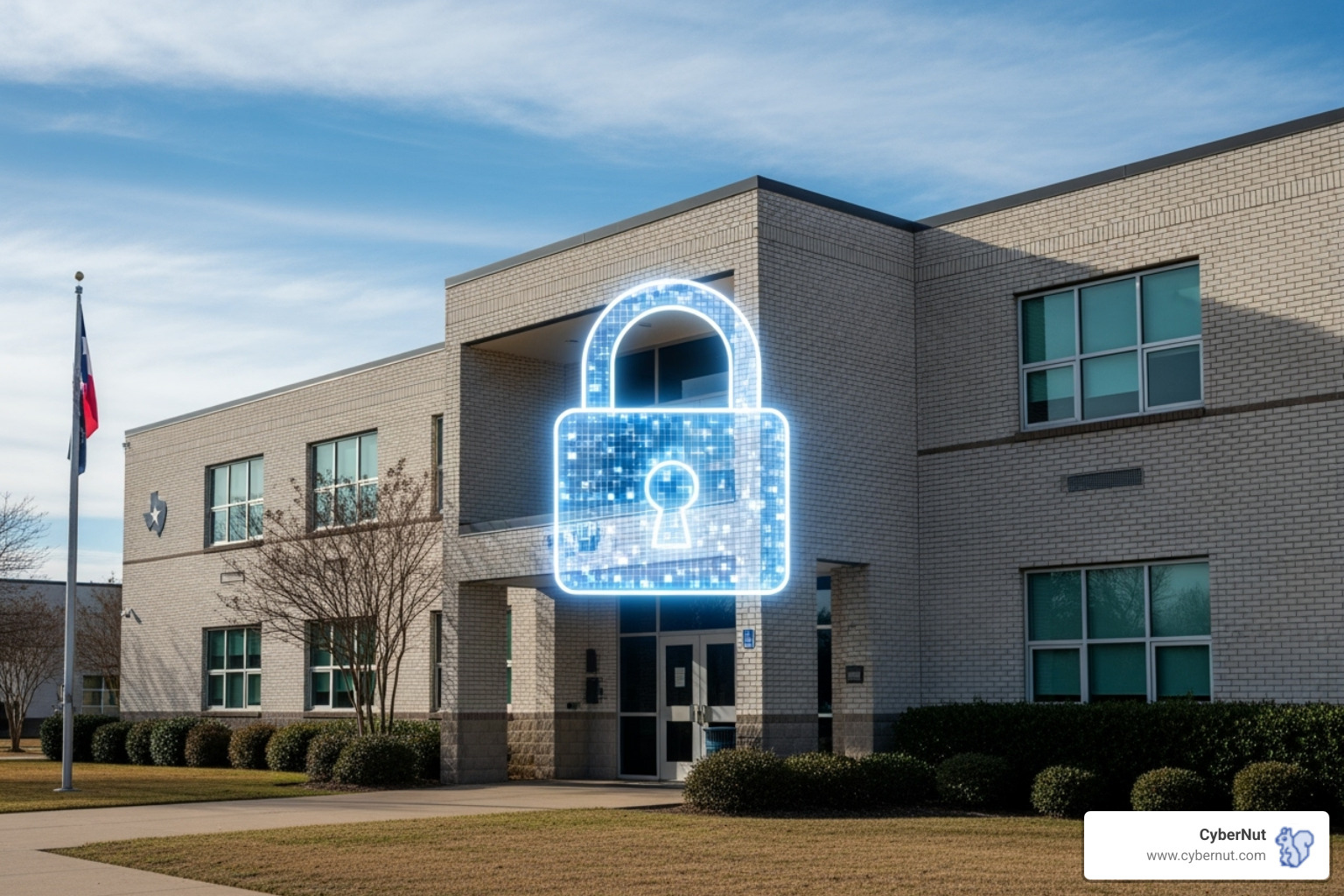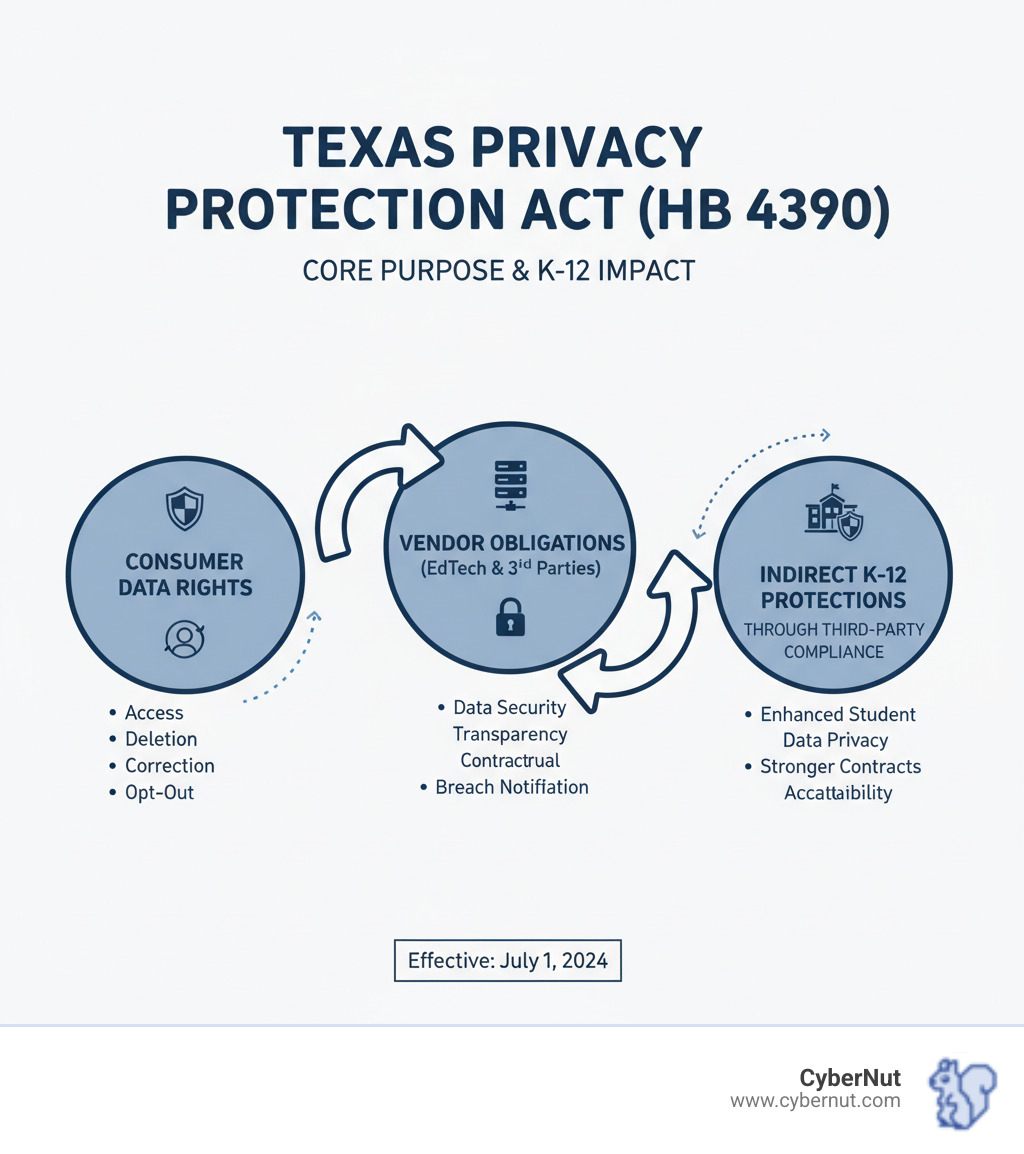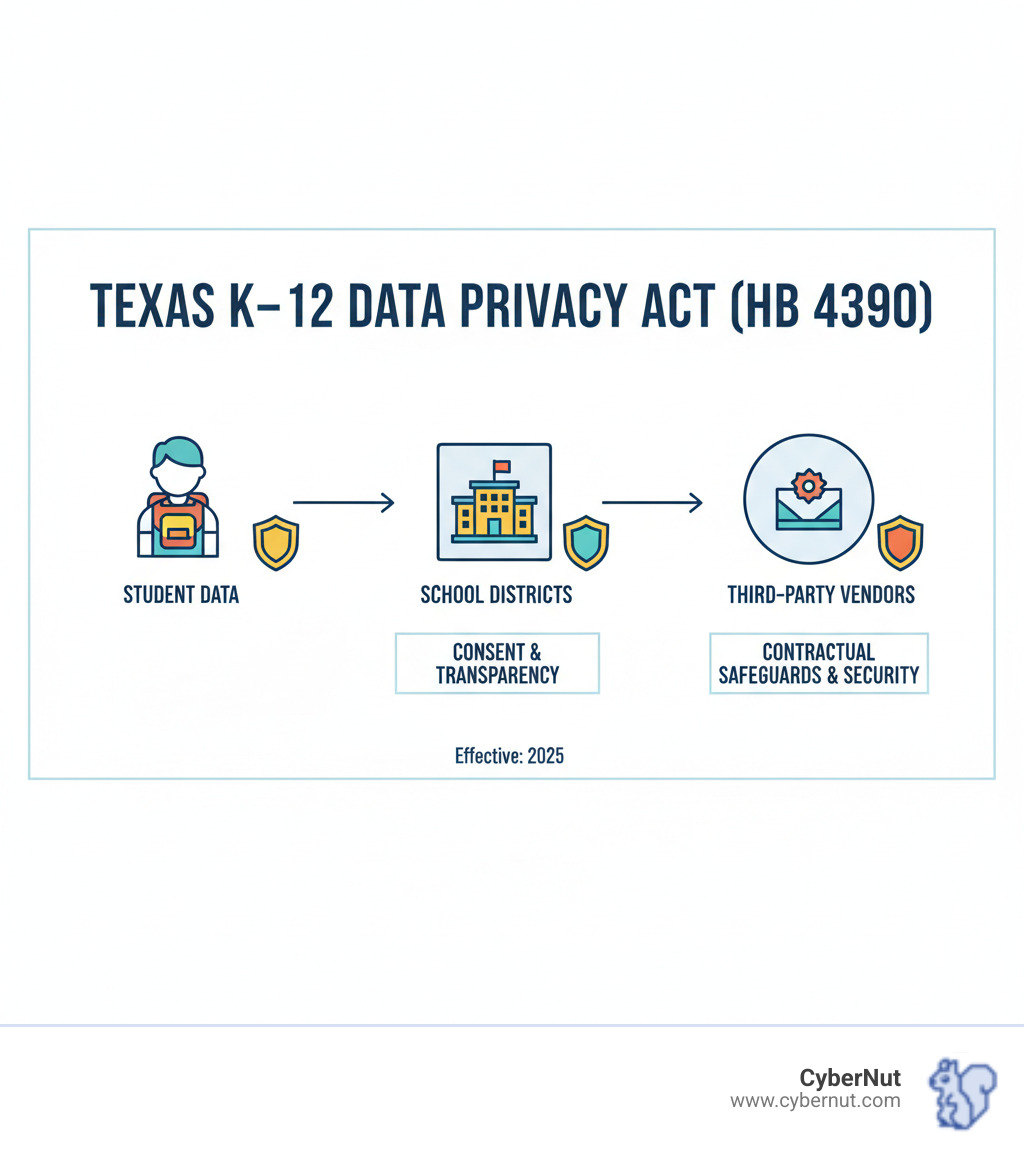
Oliver Page
Case study
September 29, 2025

What to Know About the Texas Privacy Protection Act (HB 4390) for K–12 Districts centers on understanding how this consumer privacy law indirectly affects schools through their vendor relationships. While K-12 districts are exempt from direct compliance as government entities, HB 4390 significantly impacts how educational technology companies and third-party service providers handle student data.
Key points for K-12 districts:
The law creates a new layer of student data protection by requiring vendors to implement stronger privacy controls, data breach protocols, and consumer rights mechanisms. This means K-12 IT directors must understand how HB 4390 changes their vendor landscape and contract negotiations.
For districts already managing FERPA compliance and Texas SB 820 cybersecurity requirements, HB 4390 adds another privacy framework that strengthens the overall data protection ecosystem. The key is knowing how to leverage these vendor obligations to improve your district's privacy posture.

What to Know About the Texas Privacy Protection Act (HB 4390) for K–12 Districts terminology:
As schools rely more on digital tools, protecting student information is critical. House Bill 4390, part of the Texas Data Privacy and Security Act (TDPSA), reshapes data privacy in the state by establishing a comprehensive data security framework. It gives Texans more control over their personal information and holds businesses accountable for how they handle it.
While the law primarily targets businesses, it has a significant indirect impact on schools through their vendor relationships. The EdTech companies, learning management systems, and digital tools your district uses must comply with HB 4390, meaning they must meet higher privacy standards when handling student data. This creates a win-win: schools get stronger data protection without the direct compliance burden, while students and families gain new privacy rights.
For a deeper understanding, see our Cybersecurity Insights for Texas School Districts or review the official text of HB 4390.
At its heart, HB 4390 aims to establish a privacy standard that gives consumers—including students and parents—more control over their personal data. The law focuses on several key areas:
The result is a more transparent and secure digital environment for everyone in your school community.
As government entities, Texas school districts have a non-profit exemption from direct HB 4390 compliance. However, the law works in your favor: while your district is exempt, your third-party data processors are not. Every EdTech company, software provider, and digital service your district contracts with must comply with HB 4390 if they meet the law's thresholds.
This means your vendors are legally required to implement stronger security, provide clearer privacy notices, and respect new consumer rights when handling student data. This indirect application allows districts to strengthen their data protection through vendor contracts. You can now demand that vendors demonstrate HB 4390 compliance and require stronger data processing agreements.
This approach complements existing protections like the What to Know About the Texas Student Privacy Act (Ed Code 32.151), creating a multi-layered privacy framework that benefits students, parents, and administrators.
The impact of HB 4390 on K–12 districts is indirect but powerful. Because your EdTech vendors must now operate under stricter privacy rules, districts should re-evaluate their third-party relationships with a stronger focus on data processing agreements, vendor due diligence, and the rights of parents and students.

Districts can now leverage the legal obligations on their EdTech partners to become stronger advocates for student privacy. The result is more robust vendor vetting, clearer data handling practices, and the ability to demand data minimization to ensure only necessary information is collected.
While HB 4390 doesn't directly impose requirements on districts, it creates a responsibility to ensure vendor contracts reflect the law's higher privacy standards. Key actions include:
Holding vendors accountable to HB 4390 extends the law's protections to your students.
HB 4390 expands rights for families regarding their personal data held by vendors. Districts play a crucial role in facilitating and advocating for these rights.
Districts should establish clear internal procedures for handling inquiries related to these rights. While requests will go to vendors, your staff should be prepared to guide families through the process. Your vendor agreements should also specify how vendors must respond to these requests, ensuring a seamless process that upholds student privacy.
Navigating data privacy involves federal laws like FERPA and COPPA, plus state laws like the Texas Student Privacy Act and HB 4390. These laws work together to create a stronger safety net for student data. While HB 4390 doesn't directly apply to districts, its requirements for vendors strengthen the protections you already provide under other education-specific laws.

This creates synergy with existing requirements like the cybersecurity training under Texas HB 3834 Explained: The Law That Mandates Cybersecurity Training for Educators and policies required by All About Texas SB 820: Cybersecurity Policies Required in Every School District.
While all three laws protect personal information, they have different scopes.
These laws are complementary. When an EdTech vendor complies with HB 4390's strict security requirements, they are better positioned to protect FERPA- and COPPA-covered data.
Enforcement also differs, with FERPA handled by the Department of Education, COPPA by the FTC, and HB 4390 by the Texas Attorney General. This adds another layer of accountability for your vendors.
HB 4390's provisions on automated decision-making and profiling directly impact how EdTech and AI can be used.
The law encourages a balance between Innovation and Privacy, pushing EdTech companies to innovate responsibly. This gives your district leverage to demand better privacy practices, ensuring that new technologies don't compromise student privacy. For more on this, see Cybersecurity Risks: Protecting K-12 Schools from Evolving Threats.
Although districts are exempt from HB 4390, its indirect impact through vendors requires proactive adaptation. This roadmap helps build a strong, privacy-focused bridge between your district and its vendors, strengthening your data privacy posture and building trust with families.

This approach aligns with broader cybersecurity initiatives, like the training outlined in Texas HB 3834 Explained: The Law That Mandates Cybersecurity Training for Educators, to better equip your staff.
Strengthening existing practices is key. Here are the essential steps:
The Texas Attorney General is the primary enforcement authority, with the power to investigate and penalize non-compliant vendors. This gives your district significant leverage.
These enforcement mechanisms allow you to demand that partners meet state-mandated privacy standards. This strengthens your "human firewall," as detailed in Cybersecurity Training Empowering K-12 Staff Against Cyber Threats.
The Texas Privacy Protection Act (HB 4390) is not another compliance burden for K-12 districts. Instead, it's a powerful opportunity to strengthen student data protection by leveraging the legal requirements placed on your EdTech vendors.
While districts are exempt, HB 4390 holds your commercial partners to higher standards for data security, transparency, and consumer rights. This gives you unprecedented leverage to demand stronger contracts, better procurement practices, and greater respect for the rights of parents and students. This new law complements existing frameworks like FERPA, All About Texas SB 820: Cybersecurity Policies Required in Every School District, and Texas HB 3834 Explained: The Law That Mandates Cybersecurity Training for Educators, creating a comprehensive shield for student data.
Proactive privacy management is essential. With the law now in effect, ensuring your vendor relationships are up to standard is critical. At CyberNut, we understand that privacy and cybersecurity are intertwined. Our specialized training helps K–12 staff recognize threats that could compromise the very data HB 4390 aims to protect, turning your team into a strong human firewall. Learn more about our approach in K-12 Cybersecurity Training That Engages Staff and Students -- See How Cybernut Protects Schools.
Ready to assess your district's vulnerabilities? A complimentary Phishing Audit can identify security gaps and provide the insights needed to build stronger defenses for the student data HB 4390 helps protect.

Oliver Page

Some more Insigths


Back